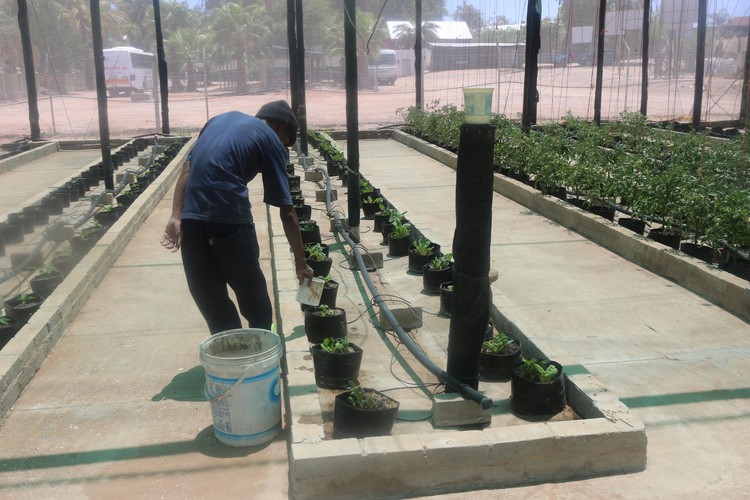
Tony Jacobs watering vegetables growing at the Oasis centre’s hydroponic garden. Photo: Selby Nomnganga
6 March 2020
The 25-year old Oasis centre in Upington is battling to keep its doors open. Government subsidies have been cancelled; income from bread sales is at risk; water for their vegetable garden is contaminated by sewage; and seven teachers have recently resigned.
The centre, which caters for about 90 people with disabilities, consists of a Early Childhood Development (ECD) Centre which opened last month, a school which caters for children aged seven to 17 as well as a skills centre for adults.
The facility came into deep financial trouble in 2018, when the Northern Cape Department of Social Development cancelled its subsidy of R20 per day for each learner at the school. Older learners and adults at the facility were reliant on the school being able to fund itself by selling bread from the Department of Education’s school feeding scheme and vegetables from its garden.
But bread sales suffered when the Department took bread off the menu two years ago. “When analysis was done, we discovered that the bread (costly starch) menu was more expensive than a cooked meal,” says Lehuma Ntuane, spokesman for the education department.
Ntuane says most schools used to feed learners bread, peanut butter and jam, but that this had been taken off the menu due to health concerns. As a result, regular orders for bread from the Oasis centre’s bakery by three primary schools, stopped.
A company supplying the centre’s bread to the Upington prison, JB Marketing, has also failed to pay it an amount of R80,000, according to Ellen Zwartz the bakery’s project manager.
GroundUp contacted the owner of JB Marketing, who did not want his name used. He acknowledged the debt but said he was paying it back through Oasis’s lawyers. He also said he often had to buy bread from Shoprite because the Oasis quality was not satisfactory.
The centre was dealt another blow when seven teachers resigned on 2 March. Four of the teachers were employed at the new ECD Centre, built with Lotto funding. The other three were at the school, which caters for 57 children. Only five teachers are left and earn R1,000 per month.
A source within Social Services told GroundUp that, “The department’s policy [was to subsidise] learners only until the age of seven” as directed by the provincial office. The source said learners aged 18 and older are subsidised by the social services department at a cost of R23,773 per month.
“The education department must take up their constitutional obligation [to provide for learners] seven years of age and upward. They were supposed to develop a special school. They don’t want to put the money in,” said the source.
To which Ntuane responded that the department of education was busy investigating the possibility of opening a special needs school.
The harvest at the centre’s hydroponic food garden has also plummeted. Spinach, green pepper, tomatoes and cucumber were harvested to be sold to the community and a few grocery shops in town, but sewage spills into canal water which is used for the garden, has reduced demand.
The centre is on the banks of the Orange River near the central business district. Water from the river is drawn through canals for businesses along its route but sewage is spilling into the canals. “The smell goes into the school” says Elmarie Hoft, the area director of the Association of People with Disabilities (APD) - a neighbour to the Oasis centre.
The garden was started again this year, using hand watering instead of irrigation, for the centre’s own consumption and for learners to work in. Marina Johannesen, who resigned as Acting Chairperson of Oasis centre in January said there were additional concerns that bacteria will be in the plants.
Patrick Williams, spokesperson for Dawid Kruiper Municipality in a press release stated that two years ago a consultant had been appointed to “investigate the sewage problem” which he attributed to the growth of the town. According to the Reviewed Integrated Development Plan for 2017 to 2022, in the ten years from 2001 to 2011 the town’s population grew by just 1.82%, that is 6,664 people.
Williams said that manholes had been dug and pipes cleared of debris but wehn GroundUp visited the area this week, the sewage spills had not been stopped and residents in the street said the problems are ongoing.